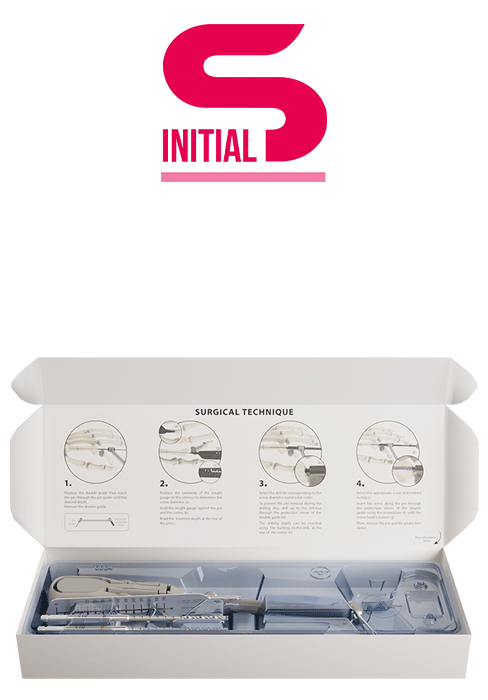The implants in the Stand-Alone Screws range are intended for the fixation of fractures, osteotomies, and bone arthrodeses in adults, and are appropriately sized for the device.
An INITIAL S range kit consists of a set of instruments or a set of instruments and implants (compression washers), to be used exclusively in orthopedic or trauma surgery during the placement of osteosynthesis screws marketed by Newclip Technics.
Phalangeal and metacarpal fractures are respectively the second and third most common fractures of the upper limb, after distal radius fractures. More specifically, they represent 40% of all upper limb fractures.
Neutralization screw fixation represents a breakthrough in the management of metacarpal and phalangeal fractures. Due to its minimally invasive nature, this technique provides stable fixation while preserving soft tissue. It promotes early recovery of mobility and limits the risk of potential complications.
Ready when you are!
An alternative treatment solution for metacarpal fractures.

The INITIAL S Inaxis kit includes instrumentation dedicated to the insertion of neutralization screws specially designed for the fixation of metacarpal fractures. This instrumentation is shared for the two associated screw diameters.
Kit composition :
- A quick-release handle
- A screwdriver
- Two drills
- A differential gauge
- A double guide
- Guide wires
Screw characteristics :
- 2 screw diameters: Ø3.0 mm and Ø4.0 mm
- Fully threaded screws with constant pitch to ensure neutralization: non-compressive design to prevent shortening in cases of transverse, oblique, or spiral fractures
- Specific design for intramedullary fixation: the screw diameter is tapered to maximize cortical anchoring and facilitate passage through the isthmus
- Self-drilling and self-tapping: the screw tip and head are designed to ease insertion
- Double threading for fast screwing and improved surgical efficiency
-
Ø1.3 mm cannula for guided screw placement

Key features of the INITIAL S Inaxis range.
- A non-compressive design preventing bone shortening
- A tapered diameter to adapt to the medullary canal
- Self-drilling and self-tapping cannulated screws for easier insertion
- An intuitive and shared instrumentation kit for the 2 screw diameters
- A sterile, single-use, ready-to-use format, suitable for emergency situations:
- No sterilization costs for the hospital
- Reduced risk of contamination¹
- Immediate access to equipment: no restocking wait time
- Reduced operating time and costs²-³
- Easier traceability thanks to detailed labeling
- Ergonomic format adapted to instrument trays³
(1) Mont et al. Single-use instrumentation, cutting blocks, and trials decrease contamination during total knee arthroplasty: a prospective comparison of navigated and nonnavigated cases. J Knee Surg. 2013;26(4):285–290. – (2) Shippert RD. A Study of Time-Dependent Operating Room Fees and How to save \0,000 by Using Time-Saving Products. Am J Cosmet Surg. 2005;22(1):25–34. – (3) Siegel GW et al., Cost Analysis and Surgical Site Infection Rates in Total Knee Arthroplasty Comparing Traditional vs. Single-Use Instrumentation. J Arthroplasty. 2015;30(12):2271–4.

